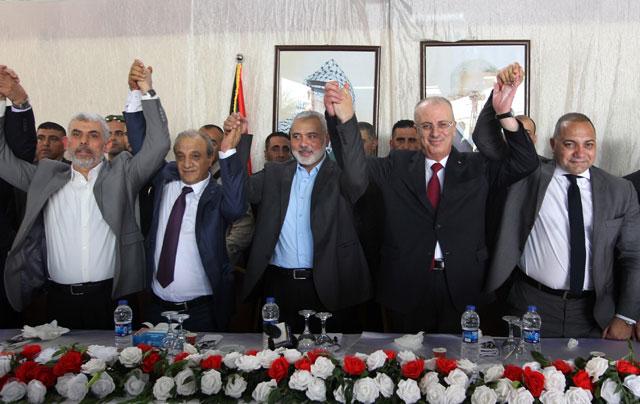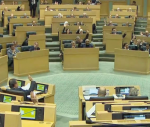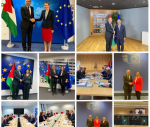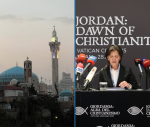You are here
Palestinian PM to visit Gaza for reconciliation efforts
By AFP - Sep 25,2017 - Last updated at Sep 25,2017
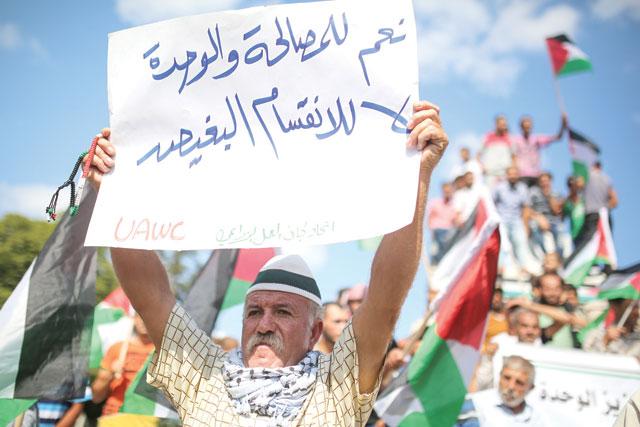
Demonstrators hold placards as they march towards Al Saraya Square during a protest against the blockade of Gaza Strip imposed by Israel for the past eleven years, in Gaza City on Sunday (Anadolu Agency photo)
OCCUPIED JERUSALEM — Palestinian Prime Minister Rami Hamdallah will travel to Gaza on October 2 as part of a fresh push to end a decade-long split between Fateh and Hamas, which runs the enclave, his government said Monday.
The visit follows concessions by Islamist group Hamas after discussions with Egypt, which has urged it to take steps towards reconciliation with Palestinian President Mahmoud Abbas' Fateh, based in the occupied West Bank.
Fateh and Hamas have been divided for more than a decade, with separate administrations in the West Bank and Gaza Strip.
"Prime Minister Rami Hamdallah has decided after consulting with President Mahmoud Abbas that the government will hold its weekly meeting in Gaza next week," government spokesman Yusuf Al Mahmoud said in a statement published by official Palestinian news agency WAFA.
"Hamdallah and members of the government will arrive in Gaza next Monday to start taking over government responsibilities after Hamas announced its agreement to dissolve the administrative committee and enable the government to assume its full responsibilities."
Hamdallah, who is not believed to have travelled to Gaza since 2015, also wrote about the visit on his Facebook page.
"I am heading to the beloved Gaza Strip next Monday with the government and all bodies, authorities and security services," he wrote.
"We hope all parties and all Palestinians will focus on the national interest to enable the government to continue carrying out all of its functions in a way which serves the Palestinian citizens first."
Hamas said a week ago that it had agreed to steps towards resolving the split with Abbas' Fateh, announcing it would dissolve a body seen as a rival government — known as the administrative committee — and was ready to hold elections.
The statement came after Hamas leaders held talks with Egyptian officials and with the Gaza Strip facing a mounting humanitarian crisis.
The UN envoy for the Middle East peace process, Nickolay Mladenov, urged the two factions not to “miss this last opportunity to bring unity”.
“Everybody recognises that the situation in which Gaza’s humanitarian problems risk exploding is extremely dangerous for everyone,” he said on a visit to Gaza on Monday.
“If we miss this opportunity, I don’t think another opportunity will come anytime soon.”
Egyptian pressure
It remains unclear whether the steps will result in further concrete action towards ending the deep division with Fateh.
Hamas for now continues to run a de facto separate administration in Gaza and is in charge of the security forces in the enclave.
Previous attempts to resolve the split have repeatedly failed. The last attempt at forging a unity government fell apart in 2015, with the two sides exchanging blame.
Both Hamas and Fateh are signalling caution.
On Monday, Hamas spokesman Fawzi Barhum said “we welcome the arrival of the government of consensus to the Gaza Strip, but it must reassure the Palestinian street through practical steps”.
Ahmed Majdalani, a senior figure in the Fateh-dominated Palestine Liberation Organisation, said Egyptian officials will also travel to Gaza to monitor how the government assumes its duties there.
Hamas has run Gaza since 2007, having seized it in a near civil war from Fateh following a dispute over parliamentary elections won by the Islamist movement the previous year.
It formed the administrative committee in March, and since then Abbas has sought to put further pressure on the Islamist movement, reducing electricity payments for the Gaza Strip and cutting salaries for public employees.
The West Bank and Gaza have not participated in an election together since 2006.
Abbas, whose term was meant to end in 2009, has remained in office with no election held.
The Gaza Strip has meanwhile faced deteriorating humanitarian conditions, including a severe electricity crisis and a lack of clean water.
The coastal enclave of some 2 million people also has one of the world’s highest unemployment rates and has been the target of three Israeli aggressions since 2008.
It has been under an Israeli blockade for around a decade, while its border with Egypt has also remained largely closed in recent years.
Facing those conditions, Hamas has turned to Egypt for assistance, particularly for fuel to produce power and with hopes of opening the border — and has faced pressure to take steps towards Palestinian reconciliation in return.
Related Articles
GAZA CITY — Palestinian Prime Minister Rami Hamdallah left the Gaza Strip on Thursday after a four-day visit aimed at reconciliation w
GAZA CITY, Palestinian Territories — Hamas said Sunday it had agreed to steps towards resolving a decade-long split with Palestinian Preside
BEIT HANUN, Palestinian Territories — Palestinian Prime Minister Rami Hamdallah visited Gaza for the first time in two years on Monday, in a


